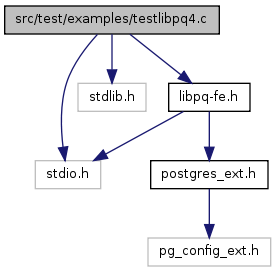#include <stdio.h>#include <stdlib.h>#include "libpq-fe.h"
Go to the source code of this file.
Functions | |
| static void | exit_nicely (PGconn *conn1, PGconn *conn2) |
| static void | check_conn (PGconn *conn, const char *dbName) |
| int | main (int argc, char **argv) |
| static void check_conn | ( | PGconn * | conn, | |
| const char * | dbName | |||
| ) | [static] |
Definition at line 25 of file testlibpq4.c.
References CONNECTION_OK, PQerrorMessage(), and PQstatus().
Referenced by main().
{
/* check to see that the backend connection was successfully made */
if (PQstatus(conn) != CONNECTION_OK)
{
fprintf(stderr, "Connection to database \"%s\" failed: %s",
dbName, PQerrorMessage(conn));
exit(1);
}
}
Definition at line 15 of file testlibpq4.c.
References PQfinish().
| int main | ( | int | argc, | |
| char ** | argv | |||
| ) |
Definition at line 37 of file testlibpq4.c.
References check_conn(), exit_nicely, i, pghost, pgport, PGRES_COMMAND_OK, PGRES_TUPLES_OK, PQclear(), PQexec(), PQfinish(), PQfname(), PQgetvalue(), PQnfields(), PQntuples(), PQresultStatus(), and PQsetdb.
{
char *pghost,
*pgport,
*pgoptions,
*pgtty;
char *dbName1,
*dbName2;
char *tblName;
int nFields;
int i,
j;
PGconn *conn1,
*conn2;
/*
* PGresult *res1, *res2;
*/
PGresult *res1;
if (argc != 4)
{
fprintf(stderr, "usage: %s tableName dbName1 dbName2\n", argv[0]);
fprintf(stderr, " compares two tables in two databases\n");
exit(1);
}
tblName = argv[1];
dbName1 = argv[2];
dbName2 = argv[3];
/*
* begin, by setting the parameters for a backend connection if the
* parameters are null, then the system will try to use reasonable
* defaults by looking up environment variables or, failing that, using
* hardwired constants
*/
pghost = NULL; /* host name of the backend */
pgport = NULL; /* port of the backend */
pgoptions = NULL; /* special options to start up the backend
* server */
pgtty = NULL; /* debugging tty for the backend */
/* make a connection to the database */
conn1 = PQsetdb(pghost, pgport, pgoptions, pgtty, dbName1);
check_conn(conn1, dbName1);
conn2 = PQsetdb(pghost, pgport, pgoptions, pgtty, dbName2);
check_conn(conn2, dbName2);
/* start a transaction block */
res1 = PQexec(conn1, "BEGIN");
if (PQresultStatus(res1) != PGRES_COMMAND_OK)
{
fprintf(stderr, "BEGIN command failed\n");
PQclear(res1);
exit_nicely(conn1, conn2);
}
/*
* make sure to PQclear() a PGresult whenever it is no longer needed to
* avoid memory leaks
*/
PQclear(res1);
/*
* fetch instances from the pg_database, the system catalog of databases
*/
res1 = PQexec(conn1, "DECLARE myportal CURSOR FOR select * from pg_database");
if (PQresultStatus(res1) != PGRES_COMMAND_OK)
{
fprintf(stderr, "DECLARE CURSOR command failed\n");
PQclear(res1);
exit_nicely(conn1, conn2);
}
PQclear(res1);
res1 = PQexec(conn1, "FETCH ALL in myportal");
if (PQresultStatus(res1) != PGRES_TUPLES_OK)
{
fprintf(stderr, "FETCH ALL command didn't return tuples properly\n");
PQclear(res1);
exit_nicely(conn1, conn2);
}
/* first, print out the attribute names */
nFields = PQnfields(res1);
for (i = 0; i < nFields; i++)
printf("%-15s", PQfname(res1, i));
printf("\n\n");
/* next, print out the instances */
for (i = 0; i < PQntuples(res1); i++)
{
for (j = 0; j < nFields; j++)
printf("%-15s", PQgetvalue(res1, i, j));
printf("\n");
}
PQclear(res1);
/* close the portal */
res1 = PQexec(conn1, "CLOSE myportal");
PQclear(res1);
/* end the transaction */
res1 = PQexec(conn1, "END");
PQclear(res1);
/* close the connections to the database and cleanup */
PQfinish(conn1);
PQfinish(conn2);
/* fclose(debug); */
return 0;
}
 1.7.1
1.7.1